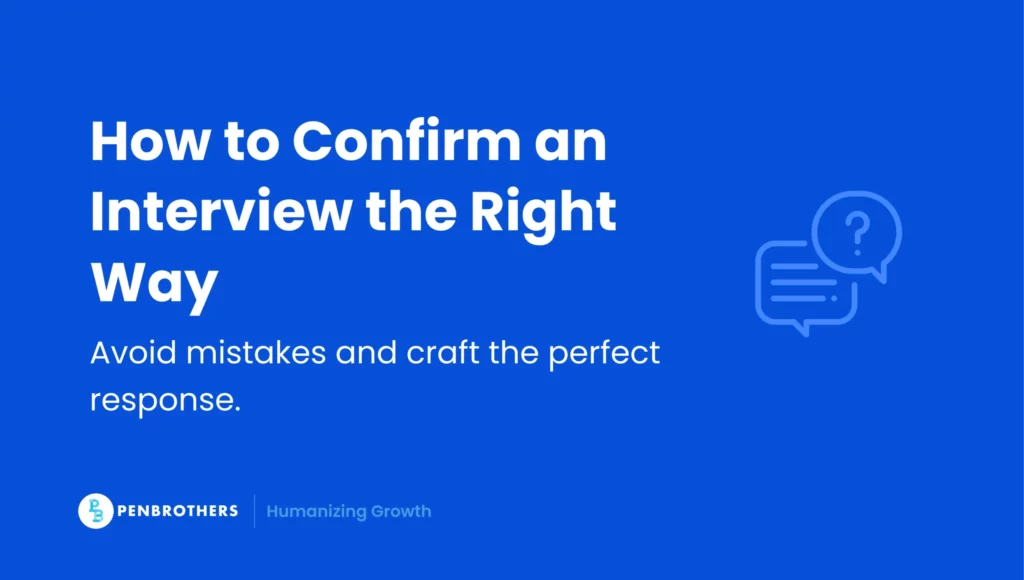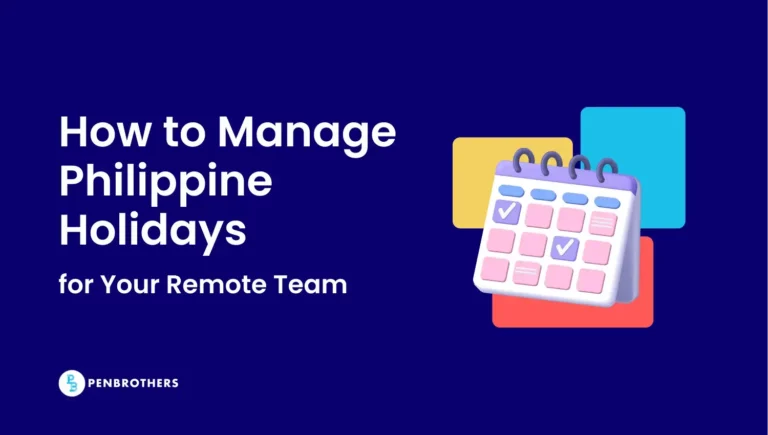The way you respond to an interview invitation is more important than you think. It’s your first direct interaction with the employer, setting the tone for the rest of the hiring process. A late, unclear, or unprofessional reply could hurt your chances before you even get to the interview. On the other hand, a confident and well-structured response makes a great first impression and positions you as a strong candidate.
Key Takeaways
- Your Reply is Your First Strategic Impression: Responding to an interview invitation is more than a simple confirmation; it’s your first opportunity to demonstrate professionalism, attention to detail, and initiative. A well-crafted reply sets a positive tone for the entire hiring process.
- Be Proactive, Not Just Polite: A standout response does more than just confirm availability. It shows foresight by reiterating key details like the date, time, and video link to prevent errors, and can even proactively suggest backup options in case of technical difficulties, which is highly valued for remote roles.
- Choose the Right Channel and Tone: Email is the standard and most professional method for responding. If you must use the phone or text, do so only if the recruiter initiated contact that way and always maintain a professional tone. Mirroring the recruiter’s communication style (e.g., formal vs. conversational) can help build unconscious rapport.
- Use the Time Before the Interview for Deep Preparation: The period between confirming the interview and the meeting itself is a critical preparation window. Use this time to gather deep intelligence on the company and your interviewers so you can connect your skills to their specific,
Why Replying Feels Harder Than It Should
Even experienced professionals hesitate when crafting their responses. Common concerns include:
- Striking the right balance between formal and friendly
- Choosing the best communication channel (email, call, or text)
- Rescheduling without seeming unreliable
This guide will help you navigate these concerns and reply with confidence.
The Right Way to Respond (Email, Call, or Text)
Email – Keep It Clear & Professional
Email is the most preferred method for responding to an interview invitation. Keep it concise yet professional. Here’s how:
- Use a strong subject line: “Interview Confirmation – [Your Name].”
- Show enthusiasm: “Thank you for the opportunity! I’m excited to meet with you.”
- Confirm details: Restate the date, time, location, or video link to ensure accuracy.
- Ask necessary questions: If applicable, ask who you’ll be meeting or if any preparation is needed.
Email Interview Invitation AI Prompt:
“Compose a professional yet approachable email confirming a job interview. Ensure the email includes a clear subject line (‘Interview Confirmation – [Your Name]’), expresses enthusiasm, confirms key details (date, time, location/video link), and asks any necessary questions. Keep it it concise, and confident. Ensure to communicate key details.“
How Do I Reply “I Am Available for an Interview”?
A strong reply isn’t just polite. It’s predictive. Recruiters and hiring managers read between the lines: Can this candidate take ownership without needing handholding? Will they be low-friction to work with across time zones or in async workflows? Instead of simply saying, “I’m available,” reframe your confirmation as a micro-performance. Reiterate the interview time and proactively suggest backup options if tech issues arise (e.g., “Should we reconnect on Google Meet if Zoom acts up?”). This builds confidence in your foresight, especially in remote-first roles where things do go wrong, and initiative trumps reactiveness.
Here’s a tactic that quietly works: mirror the communication style of the recruiter. If they wrote in a crisp, high-context format, respond in kind. If they’re more warm and conversational, dial up your tone slightly without losing precision. People often hire those they feel in sync with, and this alignment builds unconscious trust. Bonus tip: If it’s a multi-round or panel setup, politely ask if you’ll be meeting more than one person. This signals you’re preparing for real conversations, not just ticking a box.
Phone Call – Sound Confident & Prepared
If the recruiter calls you first or if you prefer to confirm verbally, be professional and to the point. Before dialing, have the job title, interviewer’s name, and interview details ready.
- Start with appreciation: “Thank you for reaching out. I’m excited about this opportunity!”
- Confirm the details: Repeat the date, time, and location.
- Ask for clarifications if needed.
Phone Call Interview Invitation AI Prompt:
“Develop a phone script that feels professional yet personal for responding to a job interview invitation. Start with a warm and appreciative tone: ‘Thank you for reaching out. I’m excited about this opportunity!’ Follow with a clear confirmation of the interview details like date, time, and location, so both parties are aligned. If needed, include a polite and natural way to ask for clarifications, ensuring the conversation flows comfortably and confidently.“
Text Message – Keep It Short & Polished
If the recruiter initially contacted you via text or if they indicate it’s their preferred method, keep your response brief yet professional.
- Introduce yourself: “Hello, [Recruiter’s Name]! [Your Name], here.”
- Confirm the interview details.
- Avoid text shortcuts: Use full words (e.g., “thank you” instead of “thx”).
- Rescheduling? Suggest an alternative date and time.
Text Message Interview Invitation AI Prompt:
“Compose a clear and professional text message reply to an interview invitation, ensuring it is well-structured and polished. The message should include a friendly introduction, a clear confirmation of interview details (job title, date, time, and location/video link), and a professional tone without abbreviations. Optionally, include a polite request for additional instructions if needed.“
How to Politely Follow Up on an Interview Invitation
Following up feels awkward to many candidates, especially senior professionals who fear sounding impatient. But in remote hiring cycles where recruiters juggle global time zones, tech glitches, and multiple pipelines. A well-timed follow-up often keeps your candidacy from falling through the cracks. If you haven’t heard back 48–72 hours after confirming your availability, a polite nudge can be the difference between being remembered or overlooked. It shows initiative without aggression, and in remote-first roles, that subtle persistence reads as high ownership.
Here’s the blind spot most articles miss: how you follow up often mirrors how you’ll navigate unclear workstreams on the job. Will you wait silently when a brief is vague, or will you follow through with clarity? A well-worded follow-up email doesn’t just secure your schedule—it quietly answers that question for the hiring team. Structure your message with gratitude, restate your earlier confirmation, and ask if there’s anything further they need. It’s a small move that builds momentum and subtly reinforces your leadership instincts, especially valued in distributed and flexible setups.
Land the Right Job with the Right First Impression
Every interaction in the hiring process shapes how you’re perceived, including how you respond to an interview invitation. A prompt, well-thought-out reply isn’t just about professionalism; it’s about demonstrating initiative, attention to detail, and respect for the people behind the hiring decision. These qualities set apart candidates who get noticed from those who get overlooked.
If you’re ready for a role where your skills and mindset truly matter, explore opportunities at Penbrothers. Take control of your career journey—just like Nicole did.
How Do I Pass My Interview After Saying Yes?
Saying “yes” to the interview is the easy part. What sets smart professionals apart is how they leverage that window between confirmation and the actual meeting. In that downtime, gather intel on the company, on who’s interviewing you, and on what kind of mindset or competencies the role likely demands. Don’t just review generic behavioral questions. Dig into how your remote work discipline, self-leadership, and outcomes-first mindset align with the company’s current pain points. If you’re applying for flexible roles, you’ll be measured as much on communication maturity and time management as on technical skills.
Another often-missed tactic: use the confirmation period to subtly build pre-interview rapport. For instance, if the recruiter shares who you’ll be speaking with, read their recent posts or product releases. Mentioning a relevant insight in the interview can signal you’ve done more than skim a website. You’ve taken the time to connect the dots. This matters even more for remote or hybrid roles, where proactive context-building is a daily habit, not a one-off task. Treat this stage not as downtime, but as your prep runway—because how you prep is often how you perform.
Frequently Asked Questions
Email is the most preferred and professional method. Your email should have a clear subject line, express enthusiasm for the opportunity, explicitly confirm the date, time, and location (or video link), and politely ask any necessary clarifying questions.
You should always include four key elements:
1. A clear subject line (e.g., “Interview Confirmation – [Your Name]”).
2. A brief expression of thanks and enthusiasm.
3. A restatement of the interview details (date, time, location/link) to ensure you have the correct information.
4. A professional closing.
If you have confirmed your availability but have not received a formal schedule, it is appropriate to send a polite follow-up email after 48 to 72 hours. This demonstrates initiative and ensures your candidacy does not get overlooked.
You should only respond via text if the recruiter contacted you that way first or has indicated it is their preferred communication method. If you do, keep the message brief and professional, using full words and avoiding text shortcuts or slang.
Use that time for strategic preparation. Research the company’s recent projects and the professional backgrounds of your interviewers. Be prepared to discuss not just your general skills, but how they can specifically solve the company’s current challenges. For remote roles, be ready to talk about your self-discipline and communication maturity.






